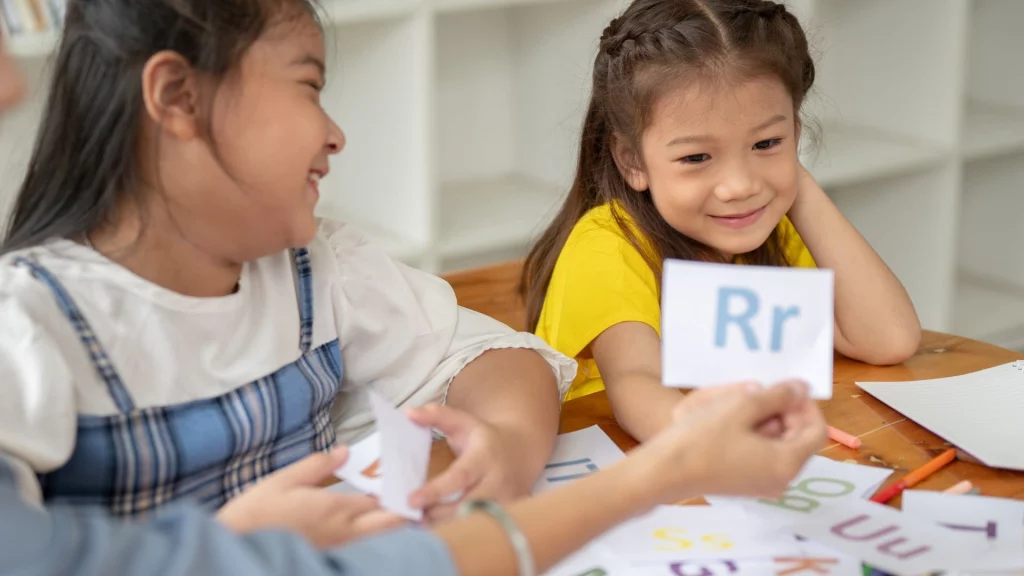Learning a foreign language can offer numerous benefits for children, from cognitive development to improved communication skills. At Innovative Learning Center, we understand that parents often wonder about the best time for their children to begin learning a new language. In this article, we will explore the ideal age for children to learn a foreign language and how starting early can be advantageous.
The Ideal Age for Children to Learn a Foreign Language
Early Childhood: Ages 0-5
Early childhood is considered one of the most beneficial times to start learning a foreign language. During these formative years, children’s brains are highly adaptable and can easily absorb new information. Here’s why this age is ideal:
- Natural Language Acquisition: Children in this age group are like sponges, soaking up new sounds and patterns effortlessly. Their ability to mimic pronunciation and intonation is at its peak.
- Cognitive Benefits: Learning a foreign language at a young age can enhance cognitive skills such as problem-solving, multitasking, and memory.
- Cultural Exposure: Early exposure to a foreign language can foster an appreciation for different cultures, making it easier for children to understand and respect diversity.
Elementary School: Ages 6-12
As children enter elementary school, they continue to benefit from learning a foreign language, though the approach might differ slightly:
- Developed Cognitive Skills: By this age, children have developed more sophisticated cognitive abilities, which can aid in understanding grammatical structures and vocabulary.
- Social and Academic Benefits: Learning a foreign language during elementary school can improve academic performance and provide social advantages, such as better communication skills and enhanced problem-solving abilities.
- Foundation for Advanced Learning: Starting language learning in elementary school sets a strong foundation for more advanced studies in middle and high school.
Adolescence: Ages 13 and Up
While it’s still beneficial to learn a foreign language during adolescence, the approach may shift:
- More Structured Learning: Teenagers can handle more complex grammar and vocabulary. They can engage in more structured learning methods and benefit from advanced language classes.
- Practical Applications: At this stage, teenagers can use the language for practical purposes, such as travel, cultural exchange programs, and future career opportunities.
- Enhanced Understanding: Adolescents are better equipped to understand and appreciate cultural nuances and the subtleties of language use.
How Innovative Learning Center Supports Early Language Learners
At Innovative Learning Center, we offer specialized programs tailored to the ideal age for children to learn a foreign language. Our curriculum is designed to be engaging and age-appropriate, ensuring that children receive the maximum benefit from their language learning experience.
- Age-Appropriate Classes: We provide classes for all age groups, from early childhood to adolescence, with curricula designed to match developmental stages.
- Experienced Instructors: Our team of experienced instructors uses interactive and immersive teaching methods to make learning a new language fun and effective.
- Flexible Scheduling: We offer flexible scheduling options to accommodate busy family schedules, making it easier for children to fit language learning into their daily routine.
Conclusion
Determining the ideal age for children to start learning a foreign language can depend on various factors, including developmental readiness and personal goals. At Innovative Learning Center, we believe that starting as early as possible can provide children with significant cognitive, academic, and social benefits. Our programs are designed to support children at every stage of their language learning journey, ensuring they have the tools they need to succeed.

FAQ
1. What is the best age for children to start learning a foreign language?
The ideal age is as early as possible, with early childhood (ages 0-5) being particularly beneficial due to the brain’s adaptability.
2. Can children learn a foreign language effectively in elementary school?
Yes, elementary school is a great time for children to learn a foreign language, as they have developed cognitive skills that aid in language acquisition.
3. Is it too late for teenagers to start learning a foreign language?
No, teenagers can still benefit greatly from learning a foreign language, with the ability to handle more complex language structures and practical applications.
Location:
- Surabaya:
- Raya Rungkut Harapan A25
- Jl. Raya Babatan Pratama No.25 Blok A
- Raya Woodland blok 6 Citraland.
- Sidoarjo:
- Delta Sari Ruko Delta Fortuna 12 A
- Raya Taman Tiara no 40
- Ruko Palm Square TF 60 Pondok Tjandra
- Puri Surya Jaya H3/3
INNOVATIVE LEARNING CENTER
Facebook : Innovative L.C.
Instagram : innovativelc
Twitter : innovativeLC
Disclaimer: The article above is an SEO article and was written by a freelance writer as a source of general information. INNOVATIVE LC makes no guarantees as to the accuracy, adequacy, or reliability of the information contained in this article. If there is incorrect information, please provide the information to: GRADIN Digital Agency
